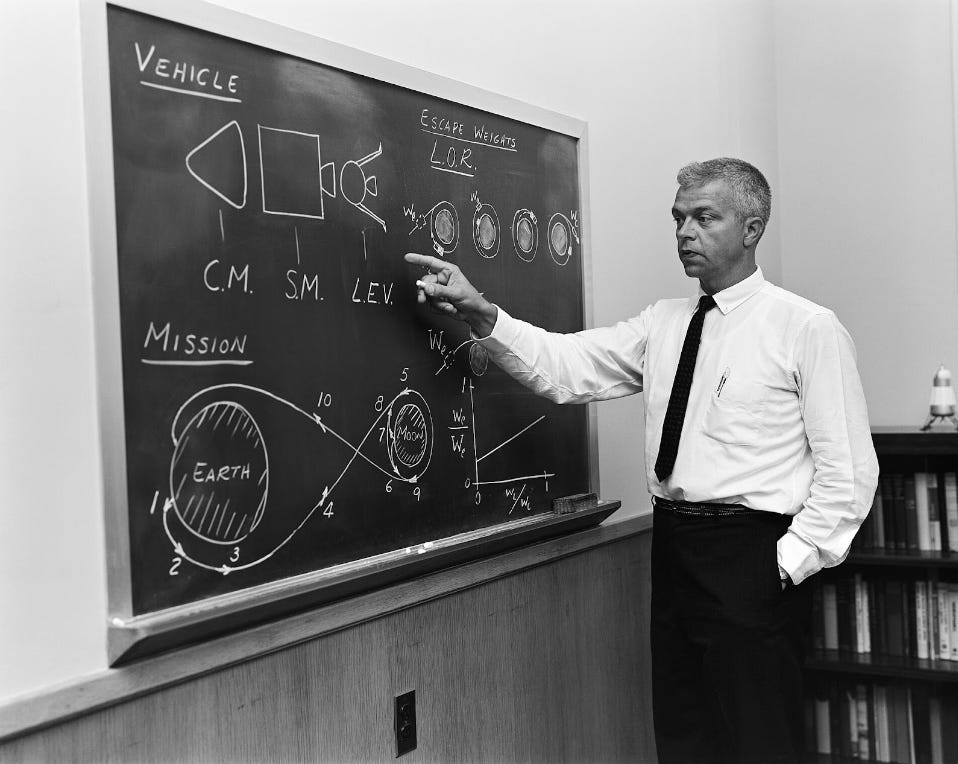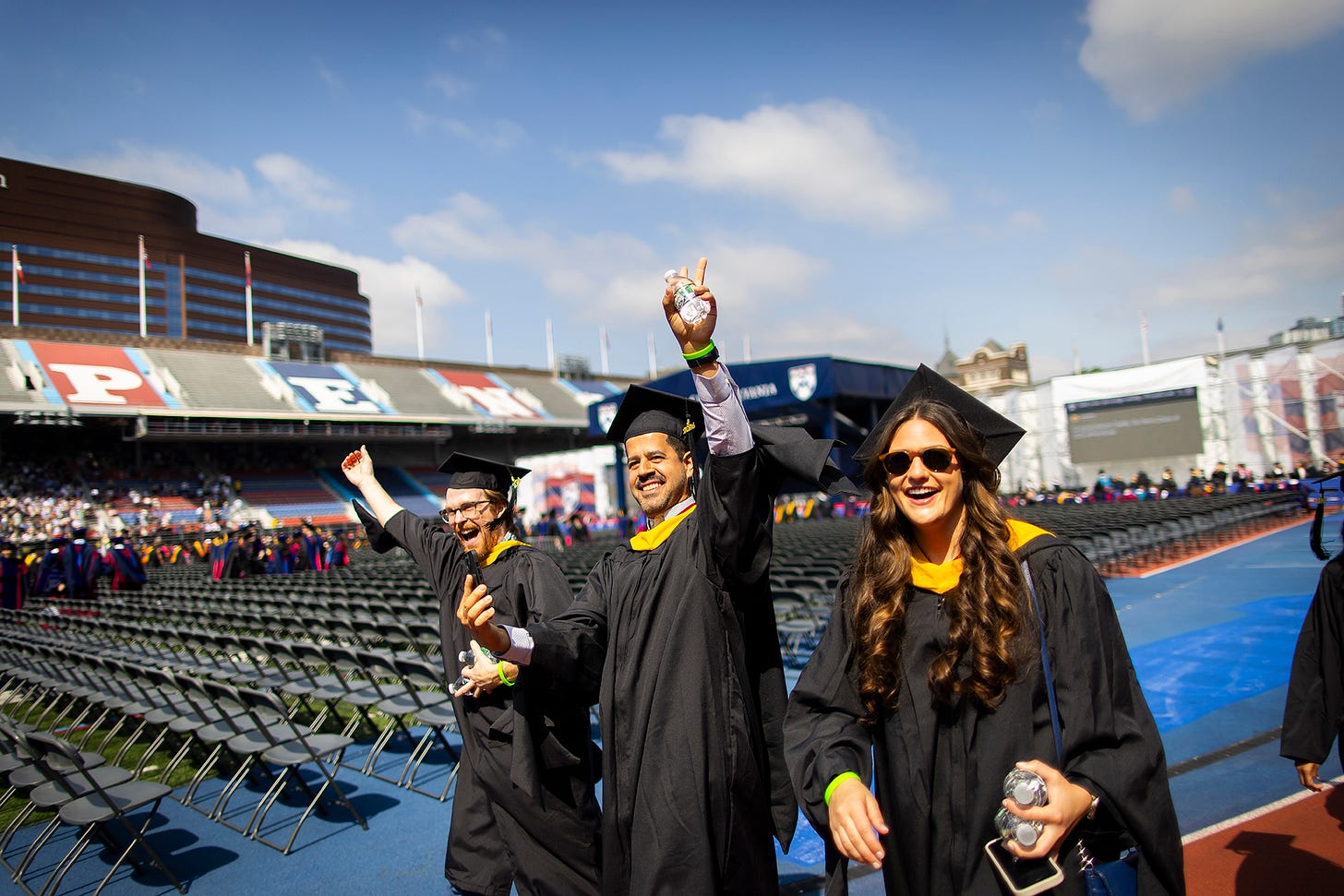You have a voice
Why INFLUX, and why you
Welcome to INFLUX, my weekly newsletter on how to increase your ability to influence others. Today, a guy who had to fight for his idea, and INFLUX’s origin story.
On September 12, 1962, JFK gave a speech in which he stated that the United States would land on the Moon before the end of the decade. The Cold War was at its peak, and the Western world needed a victory.
JFK’s message caught NASA’s leaders by surprise. Even if they wanted to, the accepted hypothesis about how to take off from Earth, land on the Moon, take off from the Moon, and safely return the astronauts was not feasible.
😅 A status quo that doesn’t work
That hypothesis — direct ascent — envisioned that all phases of the journey to the Moon would be done in a single rocket. This posed a problem: such a big rocket would require too much fuel, and then they would need an even bigger rocket, which would require more fuel…
John C. Houbolt, an engineer who worked far down in the NASA hierarchy, heard Kennedy’s message and had a sort of revelation.
What if we avoid the idea of a giant rocket that has to take off both from Earth and from the Moon?
After pondering that idea, Houbolt found an alternative, which he called Lunar Orbital Rendezvous (LOR).
In essence, LOR avoided, to some extent, the problem of fuel weight and a large rocket. LOR involved the development of a small module separate from the rocket that would land on the moon, then rejoin the rocket outside the lunar surface.
The problem was that no one at NASA believed LOR made sense. They challenged Houbolt’s idea.
🙃 If you were John, what would you have done?
Some of us might have given up:
I’ve tried already, but they didn’t listen. Surely they know better.
But John didn’t give up, and he did something that was seen as a serious breach at that time: he sent a direct letter to one of the leaders at NASA. In his letter, Houbolt explained the advantages of LOR.
Somewhat as a voice in the wilderness, I would like to pass on a few thoughts, John started his letter.
After weeks of tension and study, NASA decided that the Apollo missions would adopt LOR.
On July 20, 1969, John C. Houbolt would witness from NASA’s main control room the successful landing of humanity on the Moon during the Apollo 11 mission, using LOR.
Wernher von Braun, the engineer in charge of building the rockets used in the mission, approached John to thank him for his work:
Without your support, we wouldn’t have achieved this, John.
👀 Is this story your story?
We like to think that great ideas and amazing talent always get noticed. And, while this sometimes does happen, the sheer amount of information, noise and distractions is making this increasingly difficult, even rare.
Stories like Houbolt’s are very common, and sad at the same time.
How many great ideas are out there that no one’s championing?
How many incredible people quit instead of being persistent with their ideas, opinions and insights?
If you want to succeed, you need to win others over. You need to be able to connect with others, communicate in a clear way, and be both relevant and memorable. Day after day.
For many people, this happens naturally: the charmer, the loud voice, the boss. For the rest of us, influence is something that we need to earn.
The question is: How do you do it? Where should you start?
👉🏼 This newsletter is about YOU
About your voice, your growth, your everyday struggles.
There are thousands of courses, books and workshops on communication, storytelling and influence. A lot of it is helpful. Some of it can feel disconnected, or narrow, focused on the solution instead of trying to solve the real problem: lack of influence on others.
Here’s an alternative. You can start with this weekly newsletter, where I’ll share stories and tools on how to grow your influence, fast.
In July of this year, I started INFLUYE, a Spanish weekly newsletter focused on helping Latinos working for global companies become more influential. We’re at almost 2000 subscribers and I know there’s still a lot of room to grow.

A couple of weeks into INFLUYE, I decided to start another newsletter for the English-speaking community and the Latino group living and working in the US.
Obviously, I have a weak spot for Latino professionals. The experience of coming to the US as a Mexican immigrant has been challenging, and I’m guessing that for every other Latino reading this, you or your parents have had a similar experience.
Latinos come from a different culture, where we tend to go a little more in circles instead of starting with the point.
We are also a bit more shy in business contexts (could be because our accent, those of us who have it?), and we sometimes have a hard time building relationships with people who look different than us.
The name of this newsletter is a tribute to all of us.
🪐 INFLUX
I chose the name INFLUX for a coupe of reasons.
First, because the word influx is closely related to influence, my topic of interest. Influence and influx come from the same etymology, which is to flow, to be moved or to move something else.
According to those weird people from the Middle Ages, humans acted the way they acted because of how the planets moved. I know.
Eventually, the word influence was used to explain that —still strange— correlation between someTHING or someONE, and the behavior it caused in others.
Influx is also about the arrival or entry of large numbers of people or things which, well, it is happening.
Here are some crazy stats about the Latino influx to the US:
There are 62.6 million Latinos in the US: As of 2021, Latinos make up about 19% of the U.S. population, making them the largest ethnic minority group in the country.
The U.S. Latino population is growing like crazy: Between 2010 and 2020, the Latino population grew by 23%, compared to a 4% growth in the overall U.S. population.
The U.S. Latino GDP reached $3.7 trillion in 2022, the highest mark since the figure was first tracked — and the fifth-largest GDP in the world—.
But PLOT TWIST, there’s a third reason I chose influx, and it is has to do with change. Influx doesn't directly mean change, but an influx cause change by bringing new elements into a system or environment.
And, overall, do we live in times of change OR WHAT. Good old Charles Dickens opened A Tale of Two Cities with this very famous quote:
It was the best of times, it was the worst of times, it was the age of wisdom, it was the age of foolishness, it was the epoch of belief, it was the epoch of incredulity, it was the season of light, it was the season of darkness, it was the spring of hope, it was the winter of despair.
Things are changing (fast), and we could gain a lot by being good at managing change, both personally and organizational change.
Well, influencing others is in that same Cinematic Universe.
👋🏼 Hello, I’m Andrés
It’s likely that you don’t remember me. You can read a cool profile about me that appeared in my university’s digital newspaper. If you do read that, you might as well watch the 8-minute talk at the end of it.
If you don’t want to read the profile, it’s ok. I’ll introduce myself in two lines.
I’m Andrés. I’m originally from Monterrey, México, but moved to Philadelphia in 2022 to do a Masters program in behavioral sciences, and the decided to stay in Philly, mainly because I’m rooting for the Sixers.
I co-founded Astrolab in 2011, where we help professionals like you shine and grow faster by learning how to use storytelling for influence.
Some of our recent or current clients in the US include Colgate, L’Oréal, MAHLE North America, Wise Foods, Google (we start in October!) and Coca-Cola Southwest Beverages, and looking forward to starting with many others.
Here’s a cool pic of some of my classmates that attended one of our storytelling for influence workshops at Penn:
I’m married to Vivi, and have two usually cool kids: Eva and Gabriel. As a Latino, I do tend to speak a lot about my family. I’ll try to keep it at a reasonable level.
Because I handpicked the 150ish people who are receiving this, I’m hoping you already know me, even if we haven’t spoke in years. I hope you have at least one nice memory of us!
If we’re still not connected via LinkedIn, you can do it here. Taylor, moi and Julia. This past May during my graduation from the University of Pennsylvania
🎙️ Step up
In these times of change, we need people to stand up and speak out.
We need people like you to pay attention, to be empathetic, to solve problems. And mostly, we need people to use their voice to win others over for good.
Like this good chap:
That’s what INFLUX is about.
Every week, you’ll receive ideas, stories and super-specific hows that are designed to help you grow your storytelling, presence and influence skills.
I’ll try to make it brief, relevant, and fun. (Joking: I’ll also make it brief. Eventually.)
All feedback is welcome and crucial. So please, let me know if this first post sucks or not.
Ps. I’m not going to ask you to share INFLUX with others: I’m aspiring to F earn that right.




